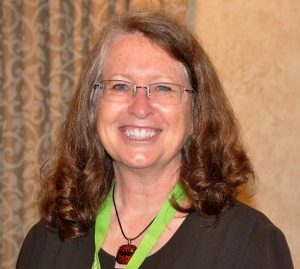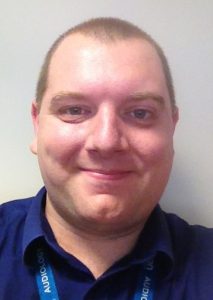 Kris English, PhD
Kris English, PhD
The University of Akron/NOAC
Matt White is an audiologist in the UK National Health System, and works in Doncaster in South Yorkshire, England. He recently participated in a counseling course at the Ear Foundation in Nottingham, wherein he described the following patient encounter:

Matt White, BSc (Hons) Aud
My patient was a man in his late 70′s who has had a rubbish time over recent years. Multiple organs are in failure, one kidney has also been removed for cancer treatment and he’s had other cancer issues too as well as issues like pancreatitis. His mobility is greatly compromised and he carries a “do not resuscitate” order with him as his physicians have told him that the efforts required to resuscitate him are likely to kill him, but in a much more horrible way than just going. He told me that his family is already grieving him in advance and he just can’t wait to be with his wife again, who passed away a few years ago.
I wasn’t sure at first what type of person he was going to be, some elderly people that I see in this condition have given up and just want to die. Others, like this gent are very positive and just want to get what they can out of the time they have left. This chap, for example, was off to get his cataracts done under local anaesthetic so he can see better. He talked about seeing the faces of his great-grandchildren more clearly. He talked about all this while explaining that he just wanted to hear as well as he could, which I was able to improve for him in the appt. Explaining all the non-hearing related parts of his life seemed to help him.
All I did was listen.

“All I Did” … But It’s Actually a Lot!
Audiologists almost inevitably downplay their supportive role as listeners, not from false modesty but because little has been said about the skills involved. These skills come easily to a few, but can be a genuine challenge to many others. Happily, they can be learned. As with any skill, it helps to break it down into steps. Consider the following steps that might occur as an audiologist meets a patient:
- As we prepare our own work, we keep alert for expressions of patient troubles, sometimes only indicated nonverbally or “between the lines.”
- When we perceive our patient is a “troubled sender” (Pollack et al., 2007), we consciously decide to “stop all the clocks” (W.H.Auden, 1937), re-prioritize, and put our agenda to the side.
- In doing so, we put the patient’s needs before our own tasks. Needless to say, easier said than done! It takes an act of selflessness to suspend our natural self-absorption (Nichols, 1995).
- We create an emotionally safe place and time for the patient to express those concerns and offer our support.
- We sustain undivided attention and focus. We do not day dream and wait it out.
- We consider whether follow up is warranted (referrals, e.g.), or whether the patient just needed to make a human connection.
- We willingly choose to open ourselves to another’s distress and share pain for a brief time.
- And then, when it seems appropriate, we find a way to transition the conversation back to the appointment, and manipulate the remaining time available to complete the “business” portion of the appointment and keep everyone on schedule.
Mastering each of these steps requires training, practice and feedback.
Learning to Mask is Hard. Learning to Listen? Much Harder!
Brownell (1996) once posed the question, Does listening require conscious effort? He answered his own question with a resounding YES.
“Although individuals can hear when they are passive, effective listening is active and mindful” (p. 55).
Someday we will find a more meaningful way to say, “All I did was listen.” When our listening is exactly what the patient needed, and when it was a conscious decision on our part, and when the patient leaves feeling better than when he arrived, “just listening” isn’t “just” anything but in fact becomes the epitome of patient-centered care. Listening is an advanced clinical skill, always worth developing and considered by many to be a life-long learning process. When students modestly describe a successful “listening moment” as accidental, let’s be sure to articulate the sophisticated skills they employed, and the value of these skills.
References
Brownell, J. (1996). Listening: Attitudes, principles and skills. Needham Heights, MA: Allyn & Bacon.
Nichols, M. (1995). The lost art of listening. NY: Guildford Press.
